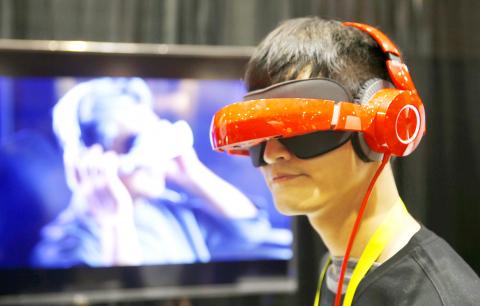Spending on personal technology gadgets is taking a hit from the economic slowdown in China and the strong US dollar, researchers from the US-based Consumer Technology Association said on Monday.
The association forecast that US$950 billion is to be spent globally on consumer electronics this year, a 2 percent drop from the US$969 billion spent last year, while the number of actual units shipped is to see little change.
“We are seeing pretty flat demand while we wait for new innovations to reach consumers,” association senior director of market research Steve Koenig said as the Consumer Electronics Show (CES) prepared to get under way in Las Vegas.

Photo: Reuters
Koenig said technology spending comparisons were “challenged” by a strong US dollar and prices dropping on market mainstays such as smartphones and tablets.
“We really see the global economy starting to get back on track as we wrestle with a range of issues,” Koenig said.
“I think the biggest thing we are starting to come to grips with is the normalization of the slowdown in China,” he added.
Smartphones and tablet computers were expected to account for 46 percent of the money spent this year on consumer electronics, but new categories such as wearables, drones and virtual-reality gear should be making their presence felt in the market, Koenig said.
When mobile computers such as laptops are included with smartphones and tablets, the share of sales in the year was predicted to be 58 percent, or about US$551 billion.
“Over half a trillion US dollars,” he said of the forecast. “I give you technology’s triumvirate: laptops, smartphones and tablets,” he added.
He spoke about the potential for tablets to be squeezed out by large-screen smartphones and portable computers, such as the Lenovo Yoga, which are designed with screens that can be removed and used as touch-controlled tablets.
Smartphone shipments were predicted to cool a bit this year, growing about 8 percent to 1.4 billion devices.
Smartphone adoption is being pushed by progressively lower prices, which is especially important in markets such as China, Africa and the Middle East, where high-end handsets are out of reach for many people.
The overall category of wearable computers, which includes smartwatches, should continue its “meteoric rise” and there is to be “no shortage” of wearable computing gadgets on the CES show floor, which officially opens today, Koenig said.
Emerging markets were seen as continuing to be central to growth in the consumer electronics market, with India becoming a driving force as China shifts to slower, steady growth after a long run of booming expansion.
“Even a small slowdown in China can have really big knockdown effects around the world,” Koenig said of the chilling effect it has had on other regions, especially those where exporting commodities is important.
“Most companies are going to start looking increasingly to India as the new place for double-digit growth year over year,” he added.
LCD TVs remain “the king of screens” with sizes trending up. One in every five TVs sold this year is expected to be 50 inches, measured diagonally, or larger and feature ultra-high-definition 4K resolution.
TVs were likely, once again, to be stars on show floor at CES, but new talent in the form of drones, robots, 3D printers and virtual reality, along with smart cars and homes were expected to grab attention and momentum.
“Make no mistake, innovation is really reshaping the global technology industry,” Koenig said.

Intel Corp chief executive officer Lip-Bu Tan (陳立武) is expected to meet with Taiwanese suppliers next month in conjunction with the opening of the Computex Taipei trade show, supply chain sources said on Monday. The visit, the first for Tan to Taiwan since assuming his new post last month, would be aimed at enhancing Intel’s ties with suppliers in Taiwan as he attempts to help turn around the struggling US chipmaker, the sources said. Tan is to hold a banquet to celebrate Intel’s 40-year presence in Taiwan before Computex opens on May 20 and invite dozens of Taiwanese suppliers to exchange views

Application-specific integrated circuit designer Faraday Technology Corp (智原) yesterday said that although revenue this quarter would decline 30 percent from last quarter, it retained its full-year forecast of revenue growth of 100 percent. The company attributed the quarterly drop to a slowdown in customers’ production of chips using Faraday’s advanced packaging technology. The company is still confident about its revenue growth this year, given its strong “design-win” — or the projects it won to help customers design their chips, Faraday president Steve Wang (王國雍) told an online earnings conference. “The design-win this year is better than we expected. We believe we will win

Chizuko Kimura has become the first female sushi chef in the world to win a Michelin star, fulfilling a promise she made to her dying husband to continue his legacy. The 54-year-old Japanese chef regained the Michelin star her late husband, Shunei Kimura, won three years ago for their Sushi Shunei restaurant in Paris. For Shunei Kimura, the star was a dream come true. However, the joy was short-lived. He died from cancer just three months later in June 2022. He was 65. The following year, the restaurant in the heart of Montmartre lost its star rating. Chizuko Kimura insisted that the new star is still down

While China’s leaders use their economic and political might to fight US President Donald Trump’s trade war “to the end,” its army of social media soldiers are embarking on a more humorous campaign online. Trump’s tariff blitz has seen Washington and Beijing impose eye-watering duties on imports from the other, fanning a standoff between the economic superpowers that has sparked global recession fears and sent markets into a tailspin. Trump says his policy is a response to years of being “ripped off” by other countries and aims to bring manufacturing to the US, forcing companies to employ US workers. However, China’s online warriors